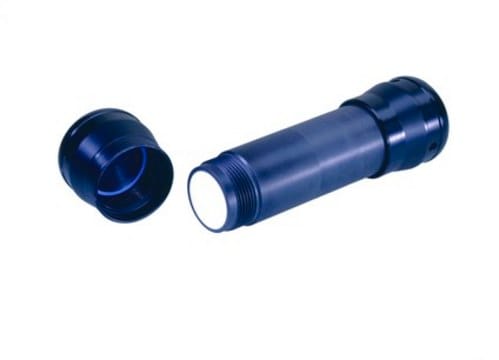1.51465
Chromolith® Si (monolithic) HPLC Columns
L × I.D. 100 mm x 4.6 mm HPLC Column
Synonym(s):
Chromolith® Performance Si 100-4.6 HPLC column
About This Item
Recommended Products
product name
Chromolith® Si, L × I.D. 100 mm x 4.6 mm HPLC column
material
PEEK column
Quality Level
Agency
suitable for USP L3
product line
Chromolith®
feature
endcapped: no
packaging
1 ea of
parameter
200 bar pressure
45 °C max. temp.
technique(s)
HPLC: suitable
LC/MS: suitable
mass spectrometry (MS): suitable (High)
column L × I.D.
10 cm × 4.6 mm
matrix
monolithic silica
matrix active group
Silica bonding phase
pore size
13 nm mesoporosity
2 μm macroporosity
operating pH range
2-7.5
separation technique
hydrophilic interaction (HILIC)
normal phase
storage temp.
no temp limit
Looking for similar products? Visit Product Comparison Guide
General description
Chromolith® Si columns have macropores with 2 μm diameter, giving a column efficiency exceeding 80,000 plates/meter. The mesopores are 13 nm (130 Å). Chromolith® Si columns fall under the USP L3 Classification. The column efficiency is comparable to a 5 μm particle size fully porous particulate column. Chromolith® Si columns are suitable for LC-MS applications.
The column dimension of 100 mm length and 4.6 mm I.D. is the best choice for separations of complex samples on any HPLC System.
The revolutionary, monolithic silica with its unique combination of macropores and mesopores enables:
—Rapid separations at very low column back-pressure
—High matrix tolerance, allowing time and cost savings with simplified workflows
—Cost-savings due to extended column lifetimes
—Connection of columns, flow gradients and the use of mobile phases with higher viscosity
The recommended Guard-columns are:
Chromolith® Si 5-4.6 guard cartridges (3 pieces) [1.52011] with the Chromolith® Guard Cartridge Holder 5 mm x 4.6 mm [1.52032]
The Chromolith® column coupler can be used to significantly increase the separation efficiency of Chromolith® columns by coupling several columns in series (up to 100,000 plates/per column). [1.51467]
Learn more:
Brochure: Race through your Separations on Any System. Chromolith® Monolithic Silica HPLC Columns
All Supelco HPLC Columns, including monolithic Chromolith® columns, are fully compatible to all HPLC and UHPLC Instruments.
Supelco HPLC Products: The Best Choice for Any LC Instrument
Application
- Improved separation and quantification of neutral and polar lipid classes: This study exemplifies the application of Chromolith® Si in environmental sample analysis, offering enhanced separation and quantification capabilities crucial for monitoring marine lipids (Graeve M et al., 2009).
- HPLC separation of some purine and pyrimidine derivatives: Highlighting the precision of Chromolith® Si in pharmaceutical research, this study focuses on the high-performance liquid chromatography separation of nucleobase derivatives, providing essential data for drug development (Kazoka H, 2007).
Analysis Note
Performance (2-nitroanisol)
Theoretical Plates (N/m) (2-nitroanisol): ≥ 80000
Capacity factor (2-nitroanisol): 1.4 - 1.9
Tailing (USP): 0.90 - 1.45 %
Selectivity
separation factor (2-nitroanisol/nitrobenzene): 3.45 - 3.95
Legal Information
Certificates of Analysis (COA)
Search for Certificates of Analysis (COA) by entering the products Lot/Batch Number. Lot and Batch Numbers can be found on a product’s label following the words ‘Lot’ or ‘Batch’.
Already Own This Product?
Find documentation for the products that you have recently purchased in the Document Library.
Articles
This article evaluates different phase chemistries for stationary phases in Hydrophilic Interaction Liquid Chromatography (HILIC) and uses multivariate analysis for classification based on chemical modification.
This article evaluates different phase chemistries for stationary phases in Hydrophilic Interaction Liquid Chromatography (HILIC) and uses multivariate analysis for classification based on chemical modification.
This article evaluates different phase chemistries for stationary phases in Hydrophilic Interaction Liquid Chromatography (HILIC) and uses multivariate analysis for classification based on chemical modification.
This article evaluates different phase chemistries for stationary phases in Hydrophilic Interaction Liquid Chromatography (HILIC) and uses multivariate analysis for classification based on chemical modification.
Our team of scientists has experience in all areas of research including Life Science, Material Science, Chemical Synthesis, Chromatography, Analytical and many others.
Contact Technical Service







